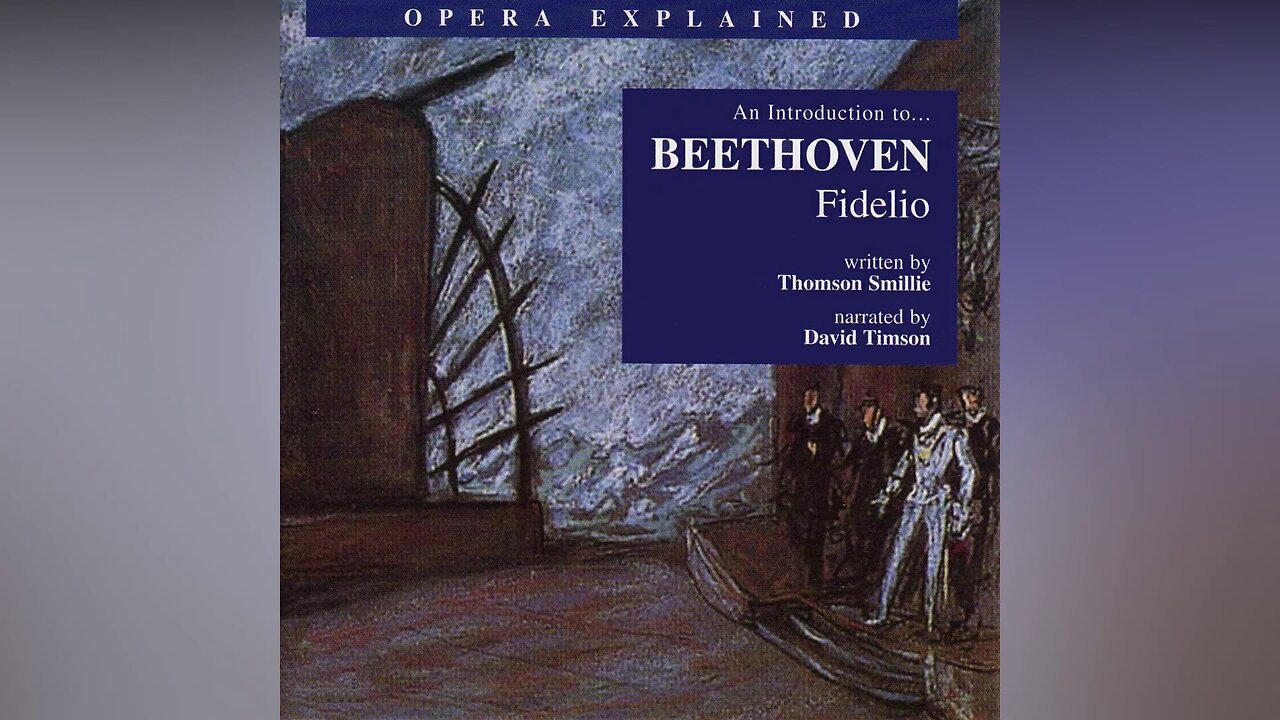Premium Only Content

Opera Explained | Fidelio by Beethoven (Audio)
"An Introduction to...Beethoven - Fidelio" written by Thomson Smillie, narrated by David Timson.
It is unsurprising that Beethoven set the operatic world ablaze with his only opera Fidelio. He was the tormented genius who set the concert hall alight with such innately dramatic works as his nine great symphonies, who wrote incandescent music for the piano – his sonatas remain the greatest works for that instrument –, and who brought a new level of drama to the contest between soloist and orchestra in his concertos. Surely the job of writing an opera should have come easily to him. Well, in fact, it did not, and the existence of four overtures to Fidelio hints at the difficulties. Beethoven was a different type of composer from Mozart, for whom the act of creation was instantaneous and the act of composition – actually writing down the notes – a clerical chore. Beethoven struggled. We know this because Mozart’s extant manuscripts are almost without corrections or second thoughts, whereas Beethoven’s sketchbooks chronicle his labours.
These musical struggles are in fact the perfect reflection of a turbulent life. Prodigally gifted as a child, Beethoven had his earliest successes as a performer of his own revolutionary music to a discerning clientele. He never starved in a garret, but in every other sense he fitted, maybe created, the mould of the Romantic artist, hair awry, beetle-browed, frowning on Fate. His private life was a mess. He fought with his family, scorned his patrons, and never achieved anything approaching emotional stability with a woman, despite many ill-fated attempts. He had a major talent for falling in love with women who were unsuitable because they were too young for him, too aristocratic, already married, or all of these things. He also aspired – maybe we all do – to play the hero in his own saga, but any chance of a heroic role was cruelly taken away by the advancing deafness which first destroyed his career as a pianist and conductor, and would later deprive him of the joy of hearing his own work.
‘Joy’ – this is not a word that one associates with such a life. ‘Fidelio’ – how strange to have a heroine whose very name embodies the quality of marital fidelity that Beethoven never knew. And heroism? This was the man who angrily tore up the dedication of his ‘Eroica’ (Heroic) Symphony when his ‘hero’ of the title, Napoleon, crowned himself emperor and proved that he was just as imperially ambitious as any other tyrant. It is opera’s supreme irony and one of music’s great truths that this tortured genius gave us a work which throughout its two acts chronicles the power of married love, celebrates human dignity, elevates freedom to the highest status among gifts, and culminates in a hymn to joy as resounding and as life-enhancing as the ‘Ode to Joy’ which would later end his Ninth Symphony. This is a work in which our delight in the glory of the music and the nobility of the themes is filtered through tears, and in which the juxtaposition of the mundane and the heroic perfectly reflect the human condition. There are four overtures but only one Fidelio, and only a man of genius who had also suffered could have written it.
Tracklist:
- Introduction to Fidelio 4:22
- The four overtures and plot outline 5:34
- Act 1: Marzelline and Jaquino 3:46
- Quartet: Marzelline, Leonore, Rocco, Jaquino 7:59
- Entrance of Pizarro 3:23
- Leonore – Recitative and Aria – ‘Abscheulicher!’ 6:48
- The Prisoners’ Chorus – ‘O welche Lust!’ 8:14
- Leonore learns her husband’s fate 4:52
- Act I: Florestan in the dungeon 10:26
- Melodrama – Leonore and Rocco dig the grave 4:50
- Leonore reveals her true identity 7:40
- Finale – ‘Liberation from tyranny’ 4:26
- Leonore releases Florestan from his chains
Performance:
Wolfgang Glashof
Alan Titus
Gösta Winbergh
Inga Nielsen
Kurt Moll
Edith Lienbacher
Herwig Pecoraro
Péter Pálinkás
József Moldvay
Hungarian Radio Chorus
Nicolaus Esterházy Sinfonia
Conductor: Michael Halász
-
 2:02:45
2:02:45
Adaneth - Arts & Literature
24 days agoGiordano: Andrea Chénier | Pavarotti, Guleghina, Pons - Levine, Joel (MET 1997-MULTISUB)
37 -
 1:11:22
1:11:22
The Rubin Report
3 hours agoWatch Joe Rogan’s Face as Elon Musk Exposes How Dems Are Cheating in Plain Sight
46.6K68 -
 1:01:07
1:01:07
VINCE
5 hours agoThe Walls Are Closing In On The Deep State | Episode 160 - 11/03/25
218K147 -
 LIVE
LIVE
LFA TV
20 hours agoLIVE & BREAKING NEWS! | MONDAY 11/3/25
2,316 watching -
 1:31:18
1:31:18
Graham Allen
6 hours agoErika Fights Back: Vows To EXPOSE TRUTH & DEMANDS Trial Goes Public!! Left Says Her Grief Is FAKE!
146K81 -
 2:08:47
2:08:47
Badlands Media
10 hours agoBadlands Daily: November 3, 2025 – Tariff Wars, SNAP Panic & Brennan Gets Confronted
66.8K17 -
 2:59:32
2:59:32
Wendy Bell Radio
9 hours agoThings Will Get Worse Before They Get Better
92.4K114 -
 1:18:28
1:18:28
The Big Mig™
5 hours agoICE Will Use Private Bounty Hunters, LFG
37.6K13 -
 1:08:17
1:08:17
Chad Prather
12 hours agoHow to Get Along With People You Don’t Even Like (Most of the Time)
126K36 -
 1:45:29
1:45:29
MTNTOUGH Podcast w/ Dustin Diefenderfer
12 hours agoTaya + Colton Kyle: Can American Marriages Survive 2025? | MTNPOD #140
32.1K